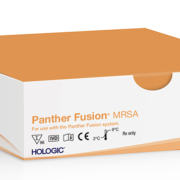MRSA assay now CE marked in Europe
The Panther Fusion MRSA assay has received CE mark in Europe. This assay, the latest in a growing menu of Panther Fusion and Aptima assays, brings full automation, efficiency and excellent assay performance to MRSA screening. The Panther Fusion system retains all the key benefits of the Panther platform, including full sample-to-result automation, and is suitable to any size laboratory. With rising antibiotic resistance in Europe and the threat posed by healthcare-associated infections to public health, the new assay will help customers provide a rapid service to hospitals, so cases of resistance, such as MRSA, are identified and managed quickly and effectively.
The Panther Fusion MRSA assay accurately detects and differentiates Staphylococcus aureus (SA) and methicillin-resistant Staphylococcus aureus (MRSA) DNA from ESwab nasal samples. It has broad strain inclusivity including the Bengal Bay clone, and is able to correctly identify empty cassette variants.
The Panther Fusion MRSA assay enables laboratory customers to leverage the benefits of the fully automated Panther Fusion system, which provides random and continuous access to improve laboratory efficiency. Laboratories can combine women’s health, virology, respiratory, hospital-acquired infections, and Open Access tests on the Panther Fusion system, running up to 32 different assays at the same time. In addition, MRSA samples can be loaded directly into the Panther Fusion, saving customers vital time and labour costs and delivering first results in 2.4 hours, considerably faster than commonly-used culture and lab developed tests. In addition, Panther Fusion offers labs the potential to process up to 500 Panther Fusion and Aptima assays in an 8-hour period.
Panther Fusion is available as a full system, or the Panther Fusion module can be attached to existing Panther systems in the field to extend testing capabilities. The Panther Fusion module adds the capacity to run PCR (polymerase chain reaction) assays in addition to tests based on TMA (transcription-mediated amplification), the proprietary Hologic chemistry used in the company’s Aptima brand. Key benefits include the ability to run multiple tests from a single sample, random and continuous access, sample processing with rapid turnaround time, continuous loading, and STAT capabilities. Its ready to use, unit-dose lyophilized reagents, which have 60-day on-board stability, help reduce waste and the need for manual reagent preparation.



